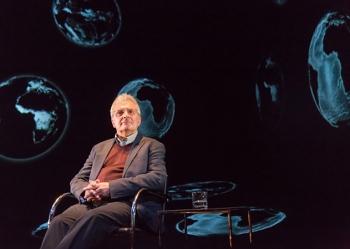2071
The future of life itself on earth may just be the hottest theatrical topic, in every sense, in an age of rampant climate change, and it's good to see the Royal Court, arguably London's most important home of new writing, tackling it. But the weird thing is that despite having director Katie Mitchell and playwright Duncan Macmillan on board, they've not produced a play at all, but a dry dramatic lecture.
Actually, dramatic is putting it a bit strongly - there's little drama in the staging, though plenty in the foreboding message of irrevocable changes being made to the earth by man's interventions and inventions.
Delivered by Professor Chris Rapley from a static chair positioned towards stage left, his credentials are impeccable: he has previously been director of the Science Museum and director of the British Antarctic Survey, and is currently Professor of Climate Science at University College, London and Chairman of UCL's Policy Commission on Communicating Climate Science.
This illustrated lecture is an attempt to communicate some of that climate science. Rapley does so, reading his speech off an autocue positioned at the front of the dress circle, in a dull monotone, while some black and white projections (designed by Luke Hall) play out behind him.
You cannot fail to feel chastened and worried by some of the data he presents. I'm relieved I won't be around when some of these predictions become a reality.
But Al Gore got there first eight years ago, with his Oscar-winning documentary An Inconvenient Truth, and although Rapley's science is now even more up-to-date and the issue, far from going away, is more pressing than ever, this is sadly not the way to present it.
"Those who tended to doze off in science lessons will feel immeasurably brighter thanks to his lucid overview of the planet's geospheres and how the world's atmosphere has changed and stabilised over millions of years."
Dominic Cavendish for The Telegraph
"A lot of theatre provides optional pleasure. This talk, which deserves wide dissemination, is better than good: it is necessary."
Michael Billington for The Guardian
"Rapley [co-writer & delivers lecture in this production] emphasises that he's a scientist, obliged to be objective rather than a polemicist. He lets the data speak for itself. But the approach feels too dry."
Henry Hitchings for the Evening Standard
"It's a bleak assessment, but Rapley's quiet, undemonstrative and deliberately fact-heavy monologue is founded on hope."
Sarah Hemming for The Financial Times
External links to full reviews from popular press
The Telegraph - The Guardian
Originally published on
